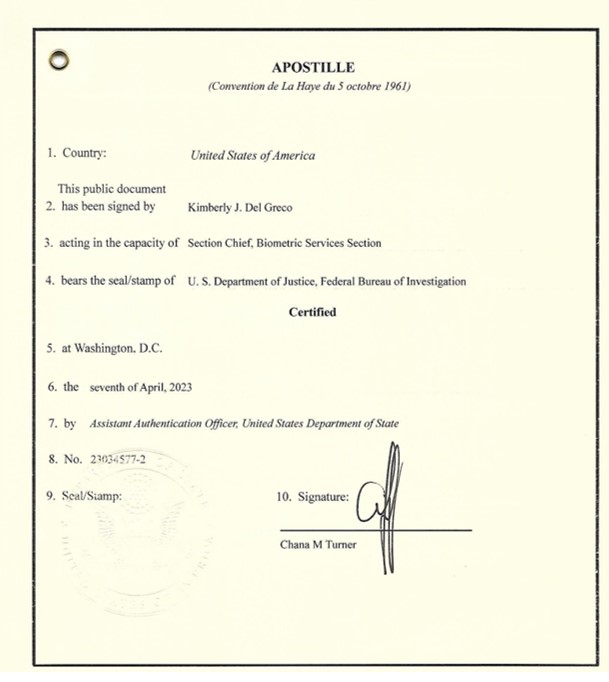Public documents, such as birth certificates, judgments, patents or notarial attestations (acknowledgments) of signatures, frequently need to be used abroad. However, before a public document can be used in a country other than the one that issued it, its origin must often be authenticated. The traditional method for authenticating public documents to be used abroad is called legalization and consists of a chain of individual authentications of the document. This process involves officials of the country where the document was issued as well as the foreign Embassy or Consulate of the country where the document is to be used. Because of the number of authorities involved, the legalization process is frequently slow and costly.
A large number of countries all over the world have joined a treaty that greatly simplifies the authentication of public documents to be used abroad. This treaty is called the Hague Convention of 5 October 1961 Abolishing the Requirement of Legalization for Foreign Public Documents. It is commonly known as the Apostille Convention. Where it applies, the treaty reduces the authentication process to a single formality: the issuance of an authentication certificate by an authority designated by the country where the public document was issued. This certificate is called an Apostille.
What is the Hague Apostille Convention?
The Hague Convention of 5 October 1961 Abolishing the Requirement of Legalization for Foreign Public Documents, commonly referred to as the Apostille Convention, is an international treaty that simplifies the process of authenticating public documents to be used abroad. The convention specifies that a single authentication, called an apostille, is sufficient to certify the document’s authenticity in all signatory countries.
What is an Apostille and when do I need one?
Under the Apostille Convention, public documents issued by a country’s authorities, such as birth certificates, marriage certificates, and academic degrees, can be certified with an apostille by the relevant authority of the same country. Once the apostille has been attached to the document, it will be recognized as a legal and authentic document in all countries that are parties to the convention.
The purpose of the Apostille Convention is to facilitate international trade, commerce, and legal proceedings by reducing the need for multiple certifications and verifications of public documents.
In which countries does the Apostille Convention apply?
The convention has been ratified by over 120 countries, including most of Europe, North and South America, Australia, Hong Kong China & Macau China, On November 7, 2023, Mainland China will join the Convention.
According to the spokesperson of the Ministry of Foreign Affairs Mao Ning, who spoke on China’s accession in a press briefing on March 10, China’s accession to the Convention will “simplify the procedures for the transnational circulation of official documents and facilitate international economic, trade and personnel exchanges”.
Where do I get an Apostille?
Each country that is party to the Convention must designate one or several authorities that are entitled to issue Apostilles. These authorities are called Competent Authorities – only they are permitted to issue Apostilles. In United States, the Secretary of State of each State and the Department of State in Washington DC are the Competent Authority to issue Apostilles. (See attached is a sample of Apostille issued by the US Department of State.)

How are Apostilles affixed to public documents?
An Apostille must be placed directly on the public document itself or on a separate attached page (called an allonge). Apostilles may be affixed by various means, including rubber stamps, self-adhesive stickers, impressed seals, etc. If an Apostille is placed on an allonge, the latter can be attached to the underlying public document by a variety of means, including glue, grommets, staples, ribbons, wax seals, etc. While all of these means are acceptable under the Convention, Competent Authorities are encouraged to use more secure methods of affixation so as to safeguard the integrity of the Apostille. Failure to affix an Apostille in a particular manner is not a basis for refusing the Apostille.
In General, an Apostille must:
- Be identified as an Apostille; and
- Include the short version of the French title of the Convention (Convention de La Haye du 5 octobre 1961); (see sample below)
An Apostille may also provide additional information. For example,
- Provide extra information about the public document to which it related.
- Provide a website (URL) of regiter where the origin of the Apostille may be verified.
